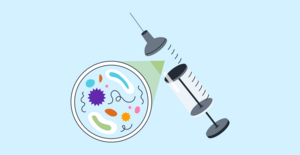Key points
- Nurse practitioners (NPs) are trained, licensed healthcare clinicians who can diagnose conditions, treat injuries and illnesses, and prescribe medications.
- NPs usually specialize in a specific medical field and need a master's degree in nursing to practice.
- In some regions, NPs can work independently, but in others they require physician oversight.
- Due to doctor shortages, NPs are increasingly filling roles in hospitals, clinics, and urgent care centers.
- Understanding the difference between NPs and MDs can be challenging due to overlapping job descriptions. Key differences include the requirement for NPs to have physician supervision in many states, and the more extensive and comprehensive training received by MDs.

Determining whether you need a traditional doctor or a nurse practitioner can be difficult, especially if you aren't sure how they differ. Here is a guide to understanding the main differences between Medical Doctors (MDs) and Nurse Practitioners (NPs).
What is a Nurse Practitioner?
According to the American Association of Nurse Practitioners (AANP), nurse practitioners, or NPs as they are sometimes referred, are trained, licensed and independent healthcare clinicians concentrated on managing patient's health conditions including treating injuries and illnesses, as well as supporting prevention. Licensed as advanced practice registered nurses (APRNs), nurse practitioners usually specialize, or even sub-specialize, in a specific medical specialty. Common specialty areas include family practice, pediatrics and women's health, whereas sub-specialties may be in dermatology, cardiology, oncology or behavioral health and psychiatry. NPs generally are required to have a master's degree in nursing to practice, while a doctoral degree in nursing practice (DNP) is becoming a more preferred degree track for this profession.
Nurse Practitioner vs. Medical Doctor
An MD is a doctor of medicine. Doctors are able to diagnose conditions, treat patients for all ailments, and write prescriptions. While a doctor may refer a patient for specialized care, such as to a neurologist, the physician has a well-rounded education that overlaps with all specialties. An NP is a nurse practitioner. This is sometimes confused with an RN, which is a registered nurse. Whereas the RN cannot prescribe medications, the nurse practitioner is licensed to do so, as well as diagnose conditions. Some states and cities have differing laws and regulations that require physicians to oversee NPs, but other areas allow NPs to work without oversight. In 34 states around the country nurse practitioners are lobbying the government to lift restrictions that are impairing their ability to help patients. Currently, only 16 states allow NPs to work without the encumbrance of MD supervision. NPs are sometimes called the bridge that connects RNs and MDs: they have two-years more education than registered nurses, but they have less training than MDs. Also, it is key to remember that an NP is licensed by the Nursing Board, whereas doctors are licensed by the Medical Doctor's Board.
The Difference in Accessibility
The United States is facing shortages of doctors all over the country, particularly in primary care. Because of this, many hospitals, private clinics, and urgent care locations are relying upon nurse practitioners to fill the excess need. Patients who demand to see traditional physicians may experience longer waiting periods before appointments, whereas patients who accept NPs could receive care more expediently. Because of this, many urgent care centers and walk-in and retail clinics are staffing nurse practitioners instead of physicians. For the services offered by the majority of urgent cares, NPs are fully licensed and capable of treating all illnesses and injuries. That said, if you have a desire to be seen by a doctor at an urgent care, do some research on your local clinic to make sure they staff physicians.
How Healthcare Is Changing
While the growing number of nurse practitioners could fill the need for more doctors in the US, many doctors are fighting not to let NPs care for patients without supervision. According to Bloomberg Business Week the United States is facing a shortage of 13,000 doctors, which could grow to more than 130,000 within 12 years. Meanwhile, there are 155,000 NPs willing to fill that need. In the near future, that could spell more freedom for NPs to practice without supervision, particularly in urgent care settings and with the roll-out of healthcare reform whereby creating the need for greater accessibility and care team accountability. Understanding the difference between nurse practitioners and traditional physicians can be difficult, because in many cases the job descriptions overlap. The key differences are that many states require NPs to have physician supervision, and that medical doctors have much more extensive and comprehensive training.
FAQs
What is a Nurse Practitioner (NP)?
An NP is a licensed healthcare clinician who can diagnose conditions, treat injuries and illnesses, and prescribe medications.
What education does a Nurse Practitioner need?
NPs generally require a master's degree in nursing to practice, though a doctoral degree in nursing practice is becoming more common.
Can Nurse Practitioners work independently?
Yes, in some states and cities, NPs can work without physician oversight. However, other regions require physician supervision.
Why are Nurse Practitioners becoming more common in healthcare settings?
Due to a shortage of doctors, especially in primary care, many healthcare facilities are relying on NPs to meet patient needs.
What is the difference between a Nurse Practitioner and a Medical Doctor?
The key differences are that many states require NPs to have physician supervision, and that medical doctors have more extensive and comprehensive training.
Are Nurse Practitioners allowed to work without the supervision of a Medical Doctor?
This varies by location. Only 16 states currently allow Nurse Practitioners to work without the supervision of a Medical Doctor. However, in 34 states, Nurse Practitioners are lobbying the government to lift these restrictions.
What is the difference in accessibility between Nurse Practitioners and Medical Doctors?
Due to the shortage of doctors, patients demanding to see traditional physicians may experience longer waiting periods before appointments. Patients who accept NPs, on the other hand, could receive care more quickly.
How is the role of Nurse Practitioners expected to change in the future?
With the growing number of Nurse Practitioners and the shortage of doctors, there could be more freedom for NPs to practice without supervision in the near future, particularly in urgent care settings and with the roll-out of healthcare reform.









